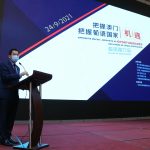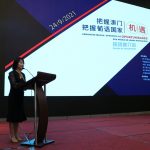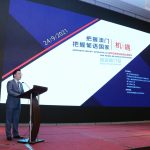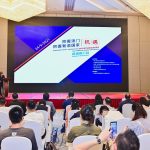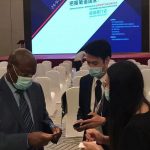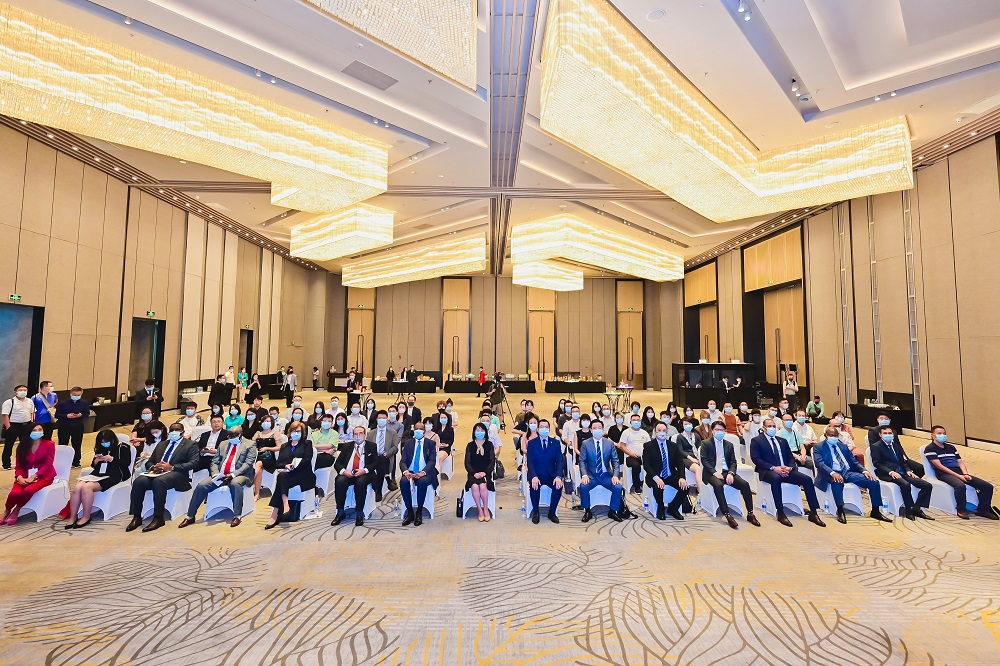 The “Join Macao, Seize PSCs Opportunities” Investor Presentation Session is held on the afternoon of 24 September.
The “Join Macao, Seize PSCs Opportunities” Investor Presentation Session is held on the afternoon of 24 September.
Taking the opportunity arising from the “Macao Week in Sichuan‧Chengdu” to give full play to Macao’s function as a platform between China and Portuguese-speaking countries (PSC), the Macao Trade and Investment Promotion Institute (IPIM) held the “Join Macao, Seize PSCs Opportunities” Investor Presentation Session today (24 Sept). The event introduced some of the PSCs’ projects, professional financial and legal services. Nearly 100 enterprises took part in the event.
Enhancing PSCs-Chengdu-Macao mutual understanding for future collaboration
IPIM Executive Director Vincent U delivered a speech at the “Join Macao, Seize PSCs Opportunities” Investor Presentation Session, jointly held by IPIM, the China Council for the Promotion of International Trade (CCPIT) Sichuan Council, Permanent Secretariat of Forum for Economic and Trade Co-operation between China and Portuguese-speaking Countries (Macao), Macau Association of Banks, Macao Lawyers Association, and China-Portuguese Speaking Countries Investment Management Company Limited. In his speech, U explained that the aim of the session is to give Chengdu enterprises a deeper understanding of Portuguese-speaking countries’ economic and trade development, as well as the services and support provided by Macao in finance, law and other professional fields. These services would facilitate the co-operation between industrial and business sectors of China and Portuguese-speaking countries, thereby promoting co-operation in trade and investment among Portuguese-speaking countries, Macao and Chengdu, and even the southwestern region of China.
Economic and trade organisations, chambers and associations of commerce, and enterprises from Chengdu were also invited to join a number of MICE events which will be held online and offline in Macao this October, including the 2021 Portuguese-speaking Countries Products and Services Exhibition (Macao) (2021 PLPEX).
Joining hands to share new opportunities
In her speech, Vice President of the CCPIT Sichuan Council Lei Xuejie said that the trade volume between China and eight Portuguese-speaking countries amounted to US$ 156 billion in 2020. She added that China is the biggest trading partner in Asia to many Portuguese-speaking countries including Portugal and Cape Verde. China has been Brazil’s biggest partner for the last decade in consecutive. According to Lei, this event would enable Sichuan to collaborate with more Macao and PSCs’ entities and usher in more open and new opportunities for shared development.
One-on-one exchange
According to Deputy Secretary-General of the Permanent Secretariat of Forum for Economic and Trade Co-operation between China and Portuguese-speaking Countries (Macao) Ding Tian, this event offers a great chance for Chengdu enterprises to improve the communication with entities Portuguese-speaking countries and Macao by having one-on-one discussion on specific area, which would also facilitate all parties’ exploration of business and co-operation opportunities.
At the session, representatives of the Portuguese-speaking countries, Macau Association of Banks, Macao Lawyers Association, and China-Portuguese Speaking Countries Investment Management Company Limited also gave their remarks and introductions, and an on-site networking session was arranged.
Participating Chengdu enterprises reported that the event allowed them to have a better understanding of the business environment and social situation in Portuguese-speaking countries, which would enable them to carry out further study. They also believe there is a good possibility for collaboration in the future.



